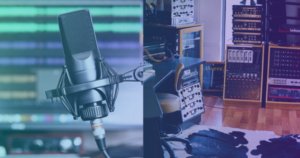In the realm of music production, artists and creators are faced with a significant decision: Should they opt for the comfort and convenience of home recording setups, or venture into the immersive realm of professional recording studios? The battle between home recording and professional studios sparks a conversation that goes beyond hardware and software, diving into the realm of creativity, sound quality, and the pursuit of sonic excellence. In this exploration, we’ll dissect both sides of the coin, comparing the merits of home recording setups with the allure of professional studios, and uncovering the pros and cons of each approach.

Advantages of Home Recording
Home recording setups offer a level of convenience that can’t be matched. Artists have the freedom to create at any time, in a space that is familiar and comfortable. With the advancement of affordable recording equipment and software, the barriers to entry have been lowered, allowing artists to experiment without breaking the bank. Additionally, the absence of time constraints empowers creators to refine their craft at their own pace, fostering an environment of experimentation and growth.
Creative Control and Intimacy
One of the most significant advantages of home recording is the level of creative control it affords. Artists can fine-tune every aspect of their production, from instrument arrangement to mixing and mastering. This hands-on approach allows for an intimate connection with the music, resulting in deeply personal and authentic creations. Moreover, the absence of external pressure fosters a safe space for artistic exploration, where mistakes can lead to unexpected breakthroughs.
Benefits of Professional Studios
Immersion in Excellence
Professional recording studios offer a sonic haven that can elevate the quality of recordings to unparalleled heights. The acoustically treated rooms, high-end microphones, and state-of-the-art equipment combine to create an environment optimized for sound capture. Recording in such a setting ensures pristine audio quality and a richness that’s hard to replicate at home.
Collaborative Dynamics
Beyond the technical advantages, professional studios provide a collaborative atmosphere that can fuel creativity. Engineers, producers, and fellow musicians contribute their expertise, leading to fresh perspectives and sonic textures that may not have been explored otherwise. The collaborative process enriches the final product, injecting it with layers of professional insight.
Evaluating the Drawbacks
The Challenges of Home Recording
While home recording setups offer convenience, they come with their share of challenges. Limited acoustics and poor soundproofing can result in compromised audio quality. The DIY approach also demands a steep learning curve for novices, as mastering the intricacies of recording, mixing, and mastering takes time and dedication.
Professional Studio Realities
On the flip side, professional studios come with financial considerations. Booking studio time can be expensive, especially for independent artists or those just starting their musical journey. Moreover, the time constraints of a studio session can lead to creative pressure, potentially stifling the artistic process.
Making the Right Choice
The decision between home recording and professional studios ultimately rests on the artist’s goals, resources, and artistic vision. Those seeking full creative control and a flexible timeline may find solace in the comforts of home recording. On the other hand, artists prioritizing top-tier sound quality and collaborative dynamics may gravitate toward the professional studio experience.
Hybrid Possibilities
Best of Both Worlds: The Hybrid Approach
In the modern age, artists are embracing a hybrid approach, combining the advantages of both home recording and professional studios. This approach allows creators to capture initial ideas and rough recordings at home while utilizing the resources of a professional studio for final mixing, mastering, and collaboration.
Conclusion
The choice between home recording and professional studios is not a binary one; it’s a spectrum of possibilities that cater to individual needs and aspirations. Whether it’s the intimate cocoon of a home studio or the immersive experience of a professional setting, what truly matters is the dedication to crafting soundscapes that resonate with the artist’s creative spirit. By understanding the strengths and limitations of both approaches, musicians can make informed choices that lead to the creation of exceptional music.
